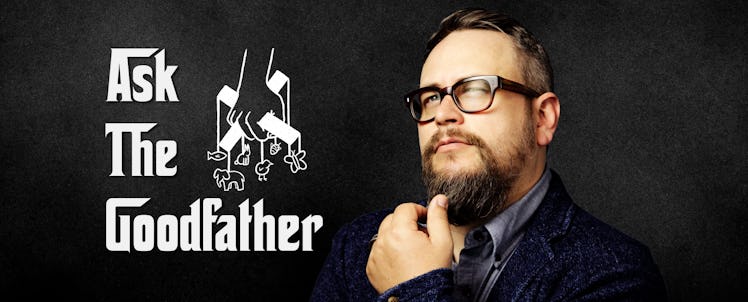On Halloween, Admit Monsters Are Real (And Scary)
Fatherly's resident parenting expert talks about helping kids who are scared of monsters and how to keep babies warm in winter.

Fatherly,
Every year around Halloween my son has serious trouble with all of the monsters and ghosts. That means he’s going to spend pretty much all of October in bed with my wife and I. How can I make him less afraid of monsters?
Miguel,
Houston, Texas
*
Real talk, Miguel. Halloween still freaks me out sometimes too. I’m a grown ass man, but if I’m walking my dog around the neighborhood in late October, I’ll be damned if I don’t get a little spooked that some masked maniac is going to come out of the shadows and dismember me with a bespoke, hand-crafted hatchet. Why am telling you that? Because fear is a normal human response to a mystery. Also, your kid’s big imagination just might turn out to be an asset in the future.
So, having a frightened kid isn’t the most convenient thing in the world. You mentioned one of the big reasons it’s not the best — the integrity of your marital bed is endangered. And while I acknowledge that’s no fun at all, I’m going to ask that you take it easy on your kid. The last thing you want to do is shame them for their fears. Because the fact is, you can tell them monsters don’t exist, but for them, they literally do.
Point of fact, at your kid’s age and about a year after, they’re still struggling with concepts of time and distance. If they see a mummy on TV, it is existing in their world in real time. You can tell them it’s movie magic all day long, but their brain literally cannot process the concept. Notably, we leverage this quality for our benefit during another holiday — what is Santa, after all, but an undead home invade.
So your job is going to be to have a good conversation with them about monsters. You’re going to start out by telling him it’s okay to be frightened because even you’re frightened of stuff. Don’t get graphic about it and be able to explain what helps you stop feeling frightened; you know, like whiskers on kittens and warm woolen mittens.
Then, you can help your son with some roleplay. Sometimes kids can feel very empowered by taking on the role of the monster or creature that scares them and scaring other people. You get to be the scared one in the scenario. Or you can roleplay with stuffed animals. Pick a stuffed animal or puppet to be afraid and see if your son can think of ways to make them feel better. Make it a game of collaborative problem-solving.
Finally, understand that your kid is frightened because he is empathetic and has a vivid imagination. Those are wonderful traits and they will be highly prized by future employers if you can cultivate them. You do that by not making him feel silly for the way he feels. Also, being open will reinforce that he can come to you and not feel belittled. You’re building trust and you’ll want that as he grows older and you’re the one who starts being afraid when he goes off into the dark night alone.
Fatherly,
It’s getting colder and every time I take my daughter out and strap her in the baby carrier her little pants ride up. Her socks don’t quite come up long enough to cover her legs, so it’s like she’s wearing capris. I have taken to pulling her socks up over her pants to keep her legs warm. What am I doing wrong? Any recommendations for keeping baby warm in the fall and winter months?
Eddie
New York, NY
*
My ancestors are Swedes, Eddie. And if there’s one thing that Swedes are good at, it’s making sure kids are warm. That’s because they let them nap outside. Yes, even during the winter. Which is to say that for guidance, we should look to the Scandinavians. They have a saying over in the Nordic countries: There’s no such thing as bad weather, just inappropriate clothing. I think that speaks to the problem you’re having. The key to dressing a kid in the winter is layering and keeping the heat they’re producing from escaping.
As far as layering goes, start with a onesie and build out from there. The point of layering is insulation and ease of temperature regulation. Basically, you can peel stuff off if the kid is getting too hot.
When considering how much heat your kid is losing, look to her head. Babies have big heads and not much to insulate them and that makes hats a necessity during the cold months. But also make sure you’re covering the extremities where there is less fat and blood circulation to keep things from freezing. With hats should come gloves and warm booties.
But, to address your specific problem, I think your solution may lay in everyone’s favorite ’80s fashion item: the leg warmer. Baby versions are still cool and super practical. They essentially eliminate the need for pulling your kid’s socks over her pants, while also adding another layer. Plus, because they’re not pants, they can stay on during diaper changes, which is huge. As long as you’re layered up and keep your kid from getting wet, they should be good to go out in all weathers and temperatures. Just make sure you watch for signs that she’s getting too cold. A shivering child is a child who needs to go inside. And pale, cold skin is skin that needs to get warm.
This article was originally published on